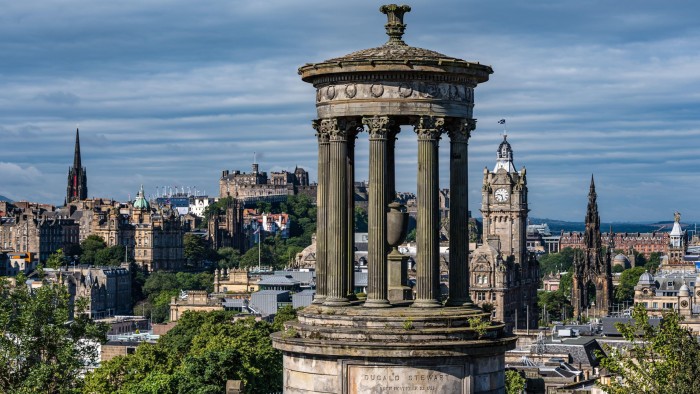Unlock the Editor’s Digest for free
Roula Khalaf, Editor of the FT, selects her favourite stories in this weekly newsletter.
The gap between Scotland’s revenues and spending has widened to 11.7 per cent of GDP, more than twice the figure for the UK, reopening the debate about the nation’s economic future ahead of next year’s elections for the Scottish parliament.
Scotland’s net fiscal deficit worsened by £5.1bn to reach £26.5bn in 2024-25, according to the Government Expenditure and Revenue Scotland report, or Gers, published annually by the devolved government in Edinburgh.
People in Scotland received almost £2,700 more per head of additional spending compared with the UK average over the period, up about £360 on the previous year, according to the report.
Scotland’s net fiscal balance as a share of GDP deteriorated by 2 percentage points while the UK’s deficit widened by 0.4 percentage points to 5.1 per cent.
North Sea oil revenues fell £800mn in 2024-25 to £4.1bn on lower global prices. Excluding the North Sea, the Scottish deficit was £30.6bn, or 14.4 per cent of GDP.
The Gers report said the widening was primarily caused by “Scottish revenue growing more slowly and Scottish expenditure growing more quickly than the UK”.
Social spending growth reflected higher expenditure on programmes such as the Scottish Child Payment, a weekly sum to support low-income families.
“These figures underline . . . how Scotland benefits from the redistribution of wealth inside the UK,” said Ian Murray, the UK government’s Scotland secretary. “It also means that devolved governments have the financial heft of the wider UK behind them when taking decisions.”
Responding to the report, the Scottish National party-led Scottish government said it showed that revenues in Scotland covered all day-to-day devolved spending.
In reserved matters such as defence, for example, the Gers allocation of UK defence spending to Scotland, based on its population share, was £5.1bn but resulted in only £2.1bn for Scottish industry in 2023-24, the Scottish government said.
Shona Robison, Scotland’s finance secretary, said an independent Scotland would be able to pursue different policies, such as increasing immigration to tackle the country’s demographic needs and mirroring Ireland’s lowering of corporate taxes to attract global multinationals.
The report showed that Scotland had the third-highest revenue per person in the UK, behind London and south-east England.
Robison also said that leaving the EU in 2020, which was opposed by a majority of Scottish voters, had reduced the country’s revenues by £2.3bn a year.
Gers “highlights imbalances in the UK economy — Scotland is tied to a low-growth, low-productivity UK. And that is something we obviously want to change,” she said.
John Swinney, Scotland’s first minister, has said that an SNP majority in the May 2026 elections will form a mandate for another referendum on independence from the UK.
The SNP is running high in the polls, with the unionist vote split by the surge to Nigel Farage’s Reform UK. But the nationalist party faces questions over its record in public services delivery after what will by next year have been 19 years in power.
The SNP won a majority in the 2011 parliamentary election that preceded the 2014 referendum, the only time this has happened since devolution in 1997. Scotland voted by 55 per cent to 45 per cent to remain in the UK.





3 Comments
uq82o0
0lbanr
9qiszv